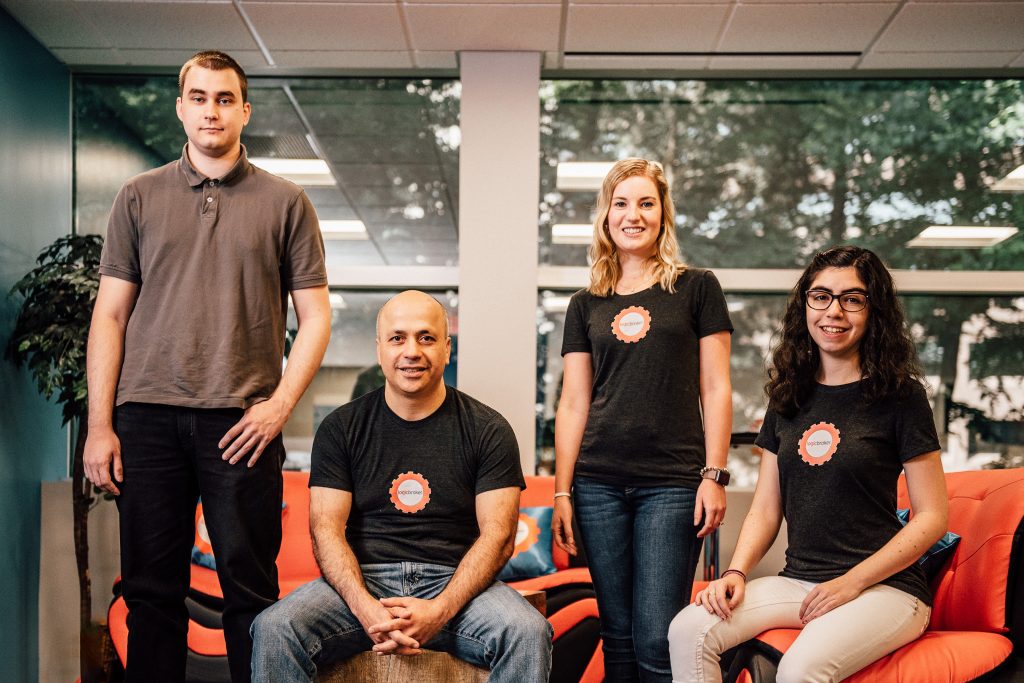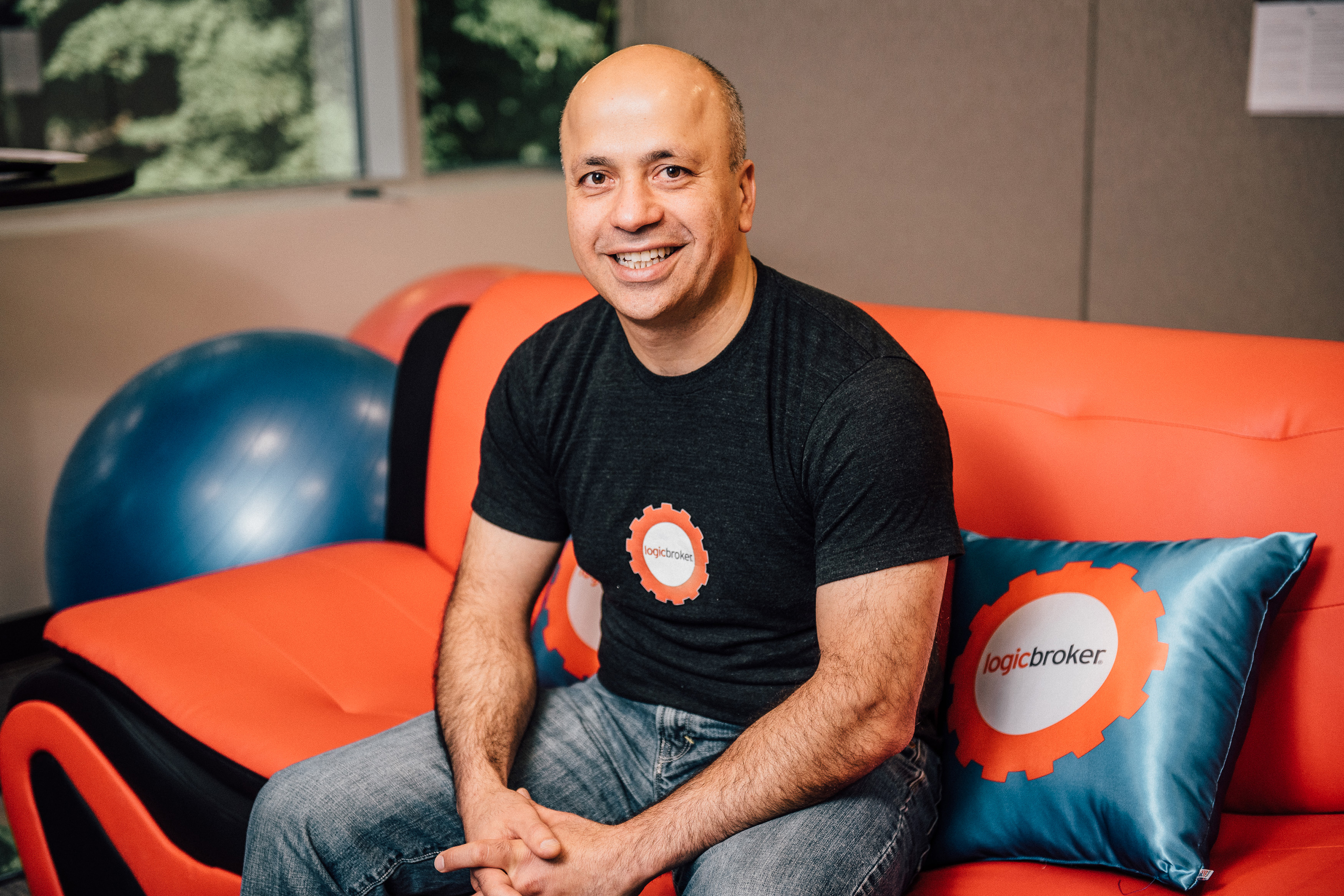From Online to Your Front Door
If you’ve made an online purchase from Rite Aid, Walmart, Amazon, Home Depot, Best Buy, or Staples recently, Peyman Zamani ’95 (ENG), ’06 MBA, and his team helped ensure that you got your order on time and in good condition.
Half the customer experience occurs after the order is placed. If your order is wrong, the next competitor is just one click away. — Peyman Zamani
Zamani is CEO of Logicbroker Inc., an e-commerce and supply-chain organization based in Shelton, Connecticut that works with more than 1,000 businesses and supports millions of customer transactions each year. Logicbroker provides electronic data interchange and drop-ship technology that unites brands, retailers, and their systems to forge the connections that enable digital commerce.
“When you shop online and place an order, we make sure you get it. We want your order to arrive quickly and correctly,” he says. “Half the customer experience occurs after the order is placed. If your order is wrong, the next competitor is just one click away. We offer a great deal of ‘white glove’ service for our clients. We tell our new clients, ‘Talk to any one of our customers. They rave about us.’”
Although Logicbroker isn’t the largest in the field, it is one of the most sophisticated and agile, says Zamani, a two-time UConn alumnus who earned his bachelor’s in computer science and engineering in 1995, and his MBA in 2006.
“One of our competitive advantages is that our technology is so far ahead. We are a small and nimble company. We offer a cloud-based integration hub. That’s helped us succeed. We can get clients up and running quickly,” he says. “You can’t measure us by the number of employees, but by our technology and the quality of our people.”
‘We get stuff done!’
A sign in the office at Logicbroker reads: “We are smart, passionate people. We work harder than our competitors. We take pride in what we are building. We deliver on our promises. We execute every day. We finish what we start. We Get Stuff Done!”
Zamani eagerly shares the story of his first job after college, working as a programmer for a fitness equipment company. He arrived at work eager to join the team, but within hours, his new boss quit. Later that day, a second supervisor went to get something from his car, and never returned.
He wondered what was going on. But the silver lining was that he was able to quickly add new skills and responsibilities to his resume, thanks to the unexpected departure of the other employees. Before parting ways with the company, he had expanded his experience to include expertise in trade shows, e-commerce, and more.
UConn Helped Zamani ‘Catch Up’
Zamani and his parents emigrated from Iran to Stamford, Connecticut when he was 17. His first jobs here were in construction, and although the money was good, he couldn’t imagine himself doing that for another 40 years.
So at 21, he enrolled in UConn, attending classes in Stamford with the intention of becoming a doctor. He found that wasn’t a good fit, but loved a computer-programming class he tried. Older than the average student, Zamani always felt he needed to make up for lost time, and the need to accelerate has been a motivating force throughout his career.
After the fitness company, Zamani worked for a consulting company, which was purchased in 2001 by Office Depot. He moved from a coder to corporate management, and worked in retail and sales. But eventually realized he needed an MBA, which he completed at the Stamford campus at the age of 35.
Then one day, the top bosses at Office Depot told him to cut his team from 200 to 50. He told them to add his name to the list of those departing.
He was ready to start his own company. “I felt there was a great opportunity out there and if I didn’t act on it, I was going to miss out,” he says. Soon after that, Logicbroker was born.
The Risks of Starting a New Company
Zamani funded the business with help from friends and family and a grant from Connecticut Innovations. He didn’t take a salary for himself until the company was profitable.
He says starting your own business is a challenge. “I’m not going to sugarcoat it. It’s tough. It takes a certain character,” he says. “You have to be willing to take out a second mortgage on your home and max out your credit cards. There’s a lot of risk.”
He credits his company’s success to good timing, advancing technology, and willingness to leap at an opportunity. He recalls one of his professors, Bernard Lovell, saying his job was to teach students how to teach themselves and to encourage them to become lifelong learners who could adapt to change. “If you can’t do that, you won’t be in business for long,” Zamani says.
He put that advice to use four years ago when he reorganized the company. And today, as he looks to expand beyond the U.S., the same advice often crosses his mind.

Logicbroker has a strong UConn presence. UConn alumni include: Rebecca Kaelin ’13 (CLAS), director of marketing; Jordan Robidas ’14 (ENG), director of application development; and Siena Biales ’18 (CLAS, ENG) and Ashley Sanders ’18 (ENG), both software developers.
Zamani says he likes to hire employees who have worked hard for what they have, particularly students who worked part-time jobs in college. He sees a work ethic in them that he appreciates.
“If you look around our office, you’ll see the productivity. No one is on Facebook,” he says. But that doesn’t mean they don’t have good perks, including free lunches and a gym membership in the building.
“Fridays we have bagels together in the morning, and at 4 p.m. we all sit down and watch ‘Silicon Valley’ together,” Zamani says. “It’s a family. We spend 40, 50, sometimes 60 hours a week here. You want it to feel good.”
Every morning, employees have a 20-minute huddle. “We talk about real stuff and we quickly make sure everyone is informed about a new sales opportunity, a new service we are offering,” he says. “We move quickly. We’re very proactive. Our people take care of issues before they become a big issue.
“We all work hard but believe in a very well balanced life,” Zamani adds. “If you have to go to your kid’s concert or get fitted for your wedding dress, we’re fine with that. We think life should be balanced.”



